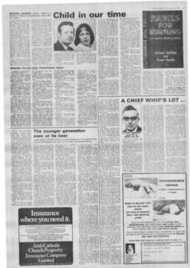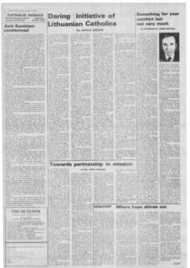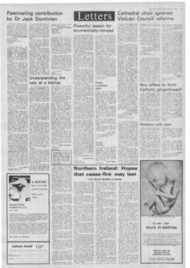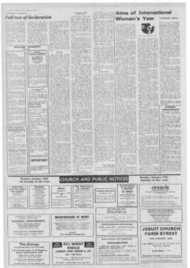Page 6, 10th January 1975
Page 6
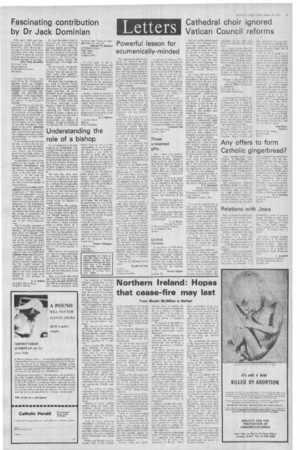
Report an error
Noticed an error on this page?If you've noticed an error in this article please click here to report it.
Tags
Share
Related articles
Clergy Are Central To Peace Talks
'ceasefire Is Endangering Soldiers' Lives'
The Catholic Herald
Provisional Ira Expected To Join Ceasefire
A Flowering Olive Branch?
Northern Ireland: Hopes that cease-fire may last
From Martin McMillan in Belfast
The reaction of Northern Ireland's politicians to the IRA's Christmas cease-fire, which has now been extended to January 16, was disappointins. One would have thought that the politicians, who have been urging political instead of military action to solve the Northern Ireland crisis, would have welcomed the cease-fire.
They could have tried, over the Christmas period, to rouse public opinion in favour of an extension of the cease-fire, thus demonstrating to the Provisional IRA that the people of all denominations want peace. Rut that is not what the politicians did. On the contrary, Ian Paisley and his colleague, William Beattie, leaders of the Democratic Unionist Party, denounced the arrangements for the cease-fire as "a sellout".
They accused Mr Merlyn Rees, Secretary of State for Northern Ireland, of making some sort of secret pact whereby the IRA cease-fire would bring about the release of internees and perhaps political prisoners of other categories. What Paisley and Beattie and most other Loyalists want is not a negotiated peace or cease-fire but all-out war against the Provisional IRA and its complete extinction. In some Loyalist quarters this is immediately interpreted as all-out war against the Catholic population.
In the minds of many Unionists in the Paisley-Beattie camp the entire Catholic population of Northern Ireland and the IRA are one and the same thing. Nothing, of course, could be further from the truth. The Catholic clergy, especially those priests and bishops who have close ties with Northern Ireland, have tirelessly denounced the IRA.
And in every election Republican candidates are invariably rejected by the Catholic voters. Catholics have give their almost overwhelming support to the more moderate Social Democratic and Labour Party.
Paisley and Beanie were especially bitter in their attacks on Dr Arthur Butler, Protestant Bishop of Connor, and on the other leading clergymen of the Irish Presbyterian and Irish Methodist Churches who accompanied Dr Butler for talks with Republican leaders in the village of Feakle, County Clare, two weeks ago.
In subsequent television interviews about the Feakle talks' the Protestant clergy were confident that they had acted correctly in meeting the Republicans.
The test of the usefulness of their venture was, of course, that it succeeded, They explained their views frankly to the Republican leaders and i pressed upon them the awful consequences of their terror campaign, especially in the minds of Northern Ireland's Protestant population. And they did persuade the IRA to cease the violence, if only temporarily.
There can be little doubt that the Secretary of State, while not committing himself publicly to any of the conditions of the IRA for a permanent cease-fire, was not displeased with what Dr Butler and his colleagues had achieved, Nor were the security forces. They enjoyed a comparatively quiet Christmas with no serious incidents at all during the ceasefire. That the IRA observed the cease-fire scrupulously was surely in itself an encouraging sign that peace was possible. Sonic of the peace-making clergy have expressed surprise at Mr Paisley's reaction, especially his accusation that the Secretary or State was about to order a mass release of internees. They reminded Paisley that he himself had been speaking very strongly against internment. Now, after the peace talks at Feakle, he wants internment to continue.
Paisley finds this incon sistency hard to explain. He also finds it hard to explain why he, as a minister of religion, cannot End it in his heart to welcome a positive move towards peace in Northern Ireland.
The reaction of the SDLP to the Feakle peace talks was certainly not hostile but it was, perhaps regrettably, rather lukewarm.
When asked his opinion, Mr John Hume, deputy leader of the party, did not seem overenthusiastic. Yet Mr Hume is not by any means a "militant" politician.
He abhors violence, and has often reminded his constituents in the Bogside and Creggan that the violence of the IRA has destroyed all credibility in the Catholics' case for civil rights. Mr Hume did not, however, show that he would seize the cease-fire as an opportunity to work more urgently for peace.
He may have been understandably sceptical since he was one of the intermediaries who arranged an earlier IRA ceasefire in 1972 only to see it ended ay the irrational reaction of the IRA leaders in Belfast. One must also allow for the reluctance of elected politicians to approve of successful overtures by non-politicians such as clergymen.
Midway through the ceasefire,on the Saturday, the clergymen who went to Feakle were urging the Government. the security chiefs and political leaders in Northern Ireland to seek ways of extending the peace. At the very least a toplevel conference would have had the effect of making the IRA wait and see what the outcome might be.
But the reaction of the entire range of Unionist politicians to this suggestion was instantly hostile. All of them. the followers of Paisley, Harry West, and William Craig, took the view that there could be no peace until the terrorists of the IRA were completely defeated.
Mr Gerry Fitt, leader of the SDLP, was more hopeful. He was ready to talk to any politicians on the other side of the divide in the hope of reaching an agreement. He would not, however, be too keen on having talks with people who were not "elected representatives".
But considering the success of the clergymen who went to Feakle and comparing that with the singular failure of the elected representatives in Northern Ireland to reconcile their differences, one wonders if Mr Fitt is entirely right. Certainly, Mr Edward Heath, Leader of the Opposition, did not confine his contacts to elected representatives when he visited Northern Ireland on Christmas Eve.
He met and talked with all sorts of people — clergymen, community leaders, trade unionists, etc, as well as MPs and members of the Northern Ireland Assembly. Mr Heath realises that more than the elected representatives should be involved in seeking peace.
The extended cease-fire now due to end on Thursday. There have been reports that Republican leaders like Rory O'Brady of Provisional Sinn Fein, David O'Connell of the Provisional IRA. and even Seamus Twomey, who enjoys the reputation of being a Republican hard-liner, all now see the futility of terror and would favour an opportunity to talk politics.
If the cease-fire continues after January 16 then the Protestant clergymen who went to Feakle will have achieved the most significant breakthrough for peace in Northern Ireland.
blog comments powered by Disqus




